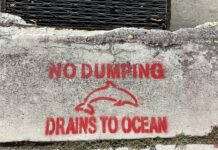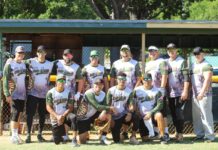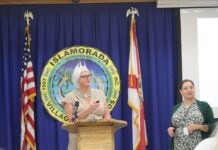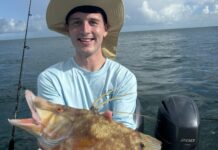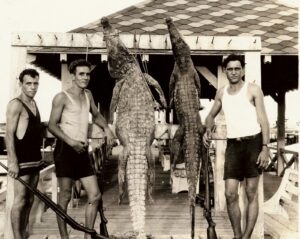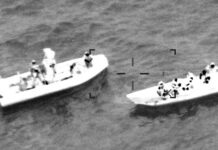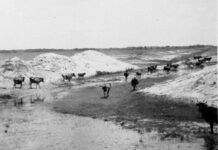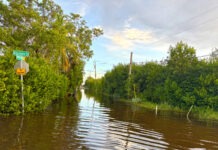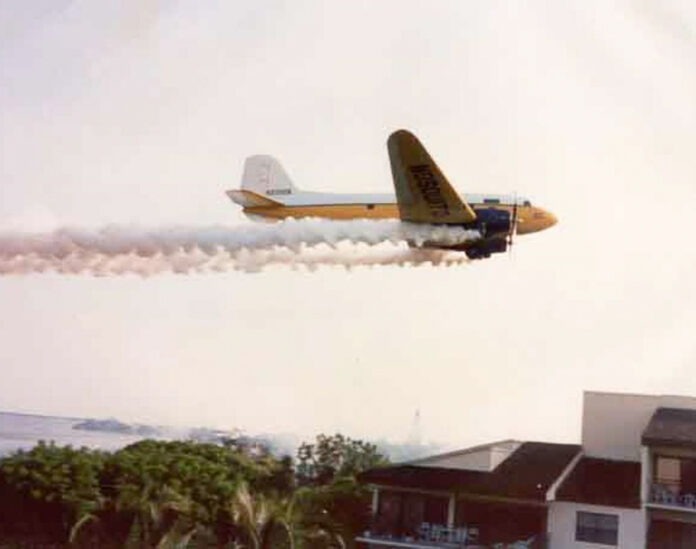
In 1949, the Florida state legislature passed a bill paving the way for the creation of what is now known as the Florida Keys Mosquito Control District (FKMCD). A few years later, in 1951, the fledgling operation consisted of one full-time employee who served as the executive director and entomologist, overseeing 14 part-time employees tasked with covering the entire 120-mile long island chain.
Today, FKMCD has a 2024-2025 budget of approximately 20 million dollars and employs roughly 71 full-time workers, half of whom are field inspectors. Mosquito control has three boats used to target mosquitoes on the offshore islands, and it now has an arsenal of five sophisticated helicopters to keep the blood-sucking insects at bay.
“We’ve come an awful long way,” acknowledged Dr. Larry Hribar, who serves as the mosquito district’s director of research. Hribar has been with mosquito control for 26 years and is credited with establishing its surveillance program, which utilizes around 70 trapping sites to identify the types of mosquitoes found throughout the Florida Keys.
“When I got here there were 45 mosquito species that had been reported in the Florida Keys, we’re up over 50 now,” said Hribar.
Executive Director Andrea Leal has been with the district for more than 20 years. Over her tenure with the agency, the focus has shifted from eradicating nuisance mosquitoes to fighting a public health battle.
“We didn’t really see a lot of diseases until about 15 years ago, when we saw Dengue fever introduced into the Florida Keys for the first time since the 1930s,” said Leal. “And that really changed our perspective on the importance of what we’re doing around here.”
The way the agency fights mosquitoes has evolved as well. Today the focus is on larviciding, targeting the immature mosquitoes living in water before they become biting adults.
“That’s been a general trend of ours for the last 15 or 20 years and we’re really proud of that,” said Leal.
“The more larviciding we’ve been doing, the less adulticiding we needed to do,” she explained. Adulticiding targets the flying, blood-sucking mosquitoes.
“We really push whatever we can do to be as environmentally sensitive as we can,” added Leal.
John Carson is a field inspector in the Lower Keys and is the longest serving FKMCD employee. He’s been with the agency for over 30 years and remembers when mosquito control had only one helicopter and two thundering World War II-era DC 3s. The low flying planes were real attention-getters.
“A lot of questions, is that plane crashing or something?” recalled John of inquiries he would field from Keys residents and visitors. “I think we’re doing a lot better now, that’s for sure,” he added. FKMCD stopped flying the old DC 3s in the late 1990s and slowly transitioned to an all helicopter fleet used for granular and liquid missions.
Back in the day, Carson logged a few thousand hours as a passenger in the helicopters with the pilots, showing them where to go to make their drops.





Now, the pilots fly the mosquito missions solo due to advances in technology.
“Computer models are on board that will show pilots exactly where the droplet cloud will come down,” said Hribar, who recalled his hair-raising early days of flying in the helicopters without the doors on.
“I said to the pilot, what’s going on? He said we can carry more product if we take the doors off,” recalled Hribar with a laugh.
When asked what living in the Florida Keys would be like without mosquito control, Hribar quickly responded, “ It would be miserable.”
Despite the advances in technology and efficiencies, field inspectors still utilize good old-fashioned footwork to help them locate areas of concern and educate residents.
“We knock on a lot of doors,” said Carson. “We walk around and dump out water and also educate them about the diseases that can come about if they’re around in the area,” he added.
The busy mosquito season coincides with hurricane season when heavy rains can lead to optimal mosquito breeding grounds.
Over the last 75 years, the Florida Keys Mosquito Control District has learned a lot about fighting the tiny disease-carrying creatures and now employees are eager to share what they’ve learned with the public they serve.
That’s why FKMCD will host its first ever open house on Tuesday, Oct. 8. There will be various educational stations showing what inspectors do daily and ways to prevent or reduce mosquitoes on your own property. Laboratory personnel will display all the different life stages of mosquitoes under microscopes. There will be arts and crafts for the kids. There will also be a naming contest for mosquito control’s new mascot. On top of that, all of the mosquito-fighting equipment will be on display, including the agency’s trucks and helicopters. Then, around 5:30 p.m. there will be an aerial demonstration.
“You’ll be able to see the helicopter just spraying water so you can get a good visual of exactly what it is that we do when we’re out there,” said Leal. “After that we’ll do a cake cutting and it should be a really great time,” she added.
The Florida Keys Mosquito Control District’s open house is free to the public and will take place on Tuesday, Oct. 8 from 4 to 7 p.m. at 503 107th St. Gulf in Marathon.



